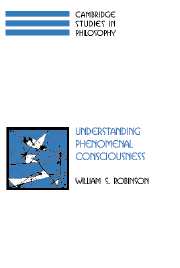10 - EPIPHENOMENALISM
Published online by Cambridge University Press: 22 July 2009
Summary
The science of our sensory and neuromuscular systems provides overwhelming evidence that all our behavior is a product of our muscles. This is evident for movements, but even holding oneself still requires muscular involvement, as becomes obvious if one holds one's hand out and tries to keep it steady. Muscles, in turn, contract as a result of chemical changes induced by activation of motor neurons. Motor neurons are activated by depolarization induced by neurotransmitters that cross synaptic clefts from other neurons. These presynaptic neurons are, in turn, activated by depolarization induced by neurotransmitters that cross synaptic clefts from still other neurons. And so on. Perhaps the activity of glial cells is involved at some point, and perhaps the activity of neurons is mediated by conditions in their microtubules. However that may be, these structures are all straightforwardly physical things, and their activities are governed by physical laws. There is ample evidence that neurons do not generate action potentials out of nowhere; on the contrary, decades of ingenious and exacting research show that neural membranes are complex gating structures that control the relation between ions inside and outside the cell and lead to activations under certain specific conditions. The picture that these facts support is one in which all our actions are effects of extremely complex, but completely physical, interactions of the cells in our brains and the neurons that lead into and away from our brains.
- Type
- Chapter
- Information
- Understanding Phenomenal Consciousness , pp. 158 - 180Publisher: Cambridge University PressPrint publication year: 2004



